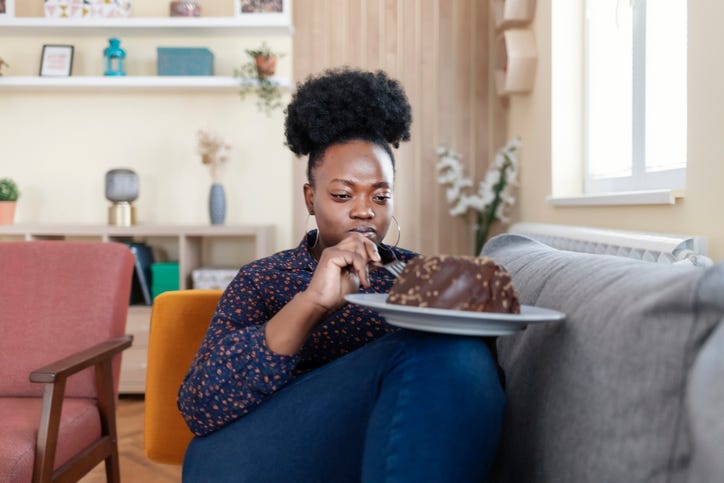Is Overeaters Anonymous A Diet?
You can find a meeting anywhere in the world, happening in the next hour. But will it help or harm?
CW for some explicit discussion of anti-fatness, dieting, specific numbers, and restrictive food behaviors. Some names have been changed to protect source privacy.
Molly went to her first Overeaters Anonymous meeting at age 25, at the insistence of her therapist. “I had been anorexic for years and suddenly it swung in the other direction,” she recalls. Molly, an accountant who lives in Kentucky, thought the real issue was her unhappiness in her then-marriage. But her therapist was sure she needed to work on her relationship with food. “She said she would not continue to see me unless I went to at least one meeting.” So Molly went. And even though every other woman in the group was already in her 40s, she was surprised by how warm and welcoming they were. “It felt like this is where I’m supposed to be,” Molly says. “I thought, ‘Oh maybe this will be the solution.’”
Molly began attending OA meetings frequently, and working with a sponsor on what she began to understand as her “food addiction.” Her sponsor and all of the literature she received borrowed heavily from the staple rhetoric of Alcoholics Anonymous, of which OA is an offshoot. Molly began to work the 12 steps and to count her days of sobriety, though in OA “you get to define what sobriety means to you,” she notes. After all, she couldn’t stop eating altogether. But in Molly’s group, “The one thing you absolutely had to do was tell your sponsor every morning what you were going to eat that day. And then you had to report back as to whether you did it.”
With her sponsor’s guidance, Molly tried several different definitions of abstinence and several different diets. She finally settled on counting Weight Watchers points and eliminating all sugar. She lived that “abstinence” for more than three years and lost a significant amount of weight, though she has always worn plus sizes. “I was a little bit of a success story,” she says.
Molly became one of her group’s leaders and began sponsoring other members. And working her program made Molly feel hopeful about her life, and her marriage. “I became convinced—and therefore he became convinced,—that all of our issues stemmed from the fact that I was an active addict,” she says. “If I could just get that under control, things would go back to being good.”
Molly felt optimistic enough about her work to go ahead and have a baby with her husband. But after her daughter, now 14, was born, Molly realized: “[OA] was a band-aid.” Molly not eating sugar didn’t make her husband want to change diapers. It didn’t wake him up in the night when the baby cried. It didn’t help her navigate her postpartum depression. “I didn’t feel any sense of support,” she says. One night, while she was up yet again with her three-month-old baby, Molly ate four pieces of cake.
The next day, she called her sponsor and said, “Oh my God, I’ve broken my sobriety!” Her sponsor was kind but matter-of-fact: “She said, ‘Well, you’ve just got to get back on track,’” Molly recalls. “But I just couldn’t. I was struggling to survive. And it felt like I had failed in this pretty public way, as a leader of the group.” Molly stopped showing up at meetings. She and her husband separated just before her daughter’s third birthday.




